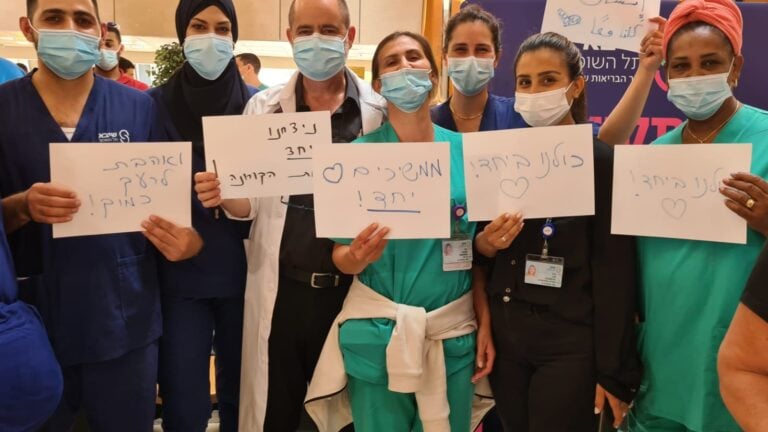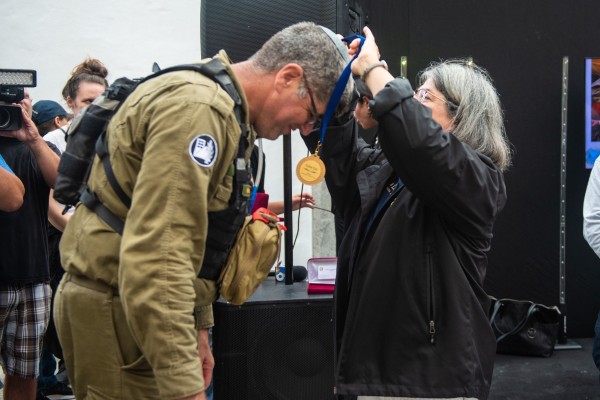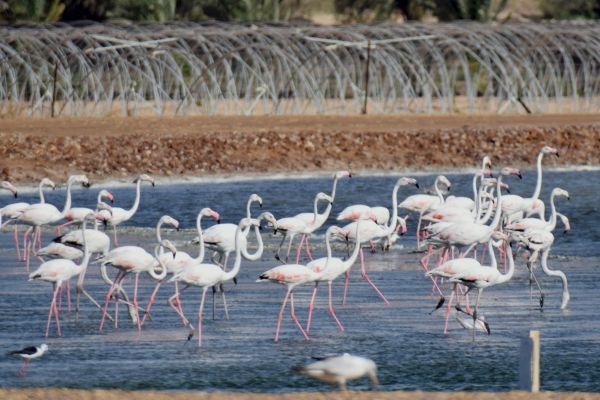Doom and gloom may seem the order of the day as we close up 2021, but this year bought plenty of things to celebrate and be proud of.
By Nicky Blackburn, Israel21c
Another difficult year of Covid is coming to a close, leaving us all exhausted by the twists and turns of this seemingly endless pandemic. Each time we think it’s coming to an end, nature throws us a curve ball – first it was Delta and now it’s Omicron.
While the pandemic may have upended our lives, and dominated the news cycles worldwide, there are plenty of other things that have also been happening that not only warrant our attention, but in fact deserve a shoutout.
As we near the end of 2021 and look forward to what we all hope will be a better new year, join us in celebrating and sharing some of the many positive things that have happened this year.
Here are 21 reasons to be cheerful. Why not share with friends and family to raise the spirits of all as we move into a new year.
We’d love to hear what made you happy too. Tell us in the comments below.
1. Scientists are learning to talk to whales.
Perhaps finally we are about to learn what Sperm whales think and talk about, an opening of communication to the natural world that could transform the way we coexist with the creatures of our planet.
This year, marine scientists from Israel, the United States, the United Kingdom and more, launched an ambitious five-year Cetacean Translation Initiative (CETI) in the Caribbean to decipher how Sperm whales communicate and whether their speech patterns can be replicated so humans can communicate with them.
The Sperm whale, a vulnerable species, has the largest brain on Earth, more than five times heavier than a human’s. Like humans, it has a complex communication system and lives in tightly knit family groups.
This was one of my favorite stories of the year, and we’ll be watching the research.
2. Touching or sniffing plants is good for your health.
New research shows that sniffing or interacting with plants can increase your wellbeing. And who wouldn’t want to increase their well-being after the last two years?
In a study published in Conservation Biology, researchers from the Technion-Israel Institute of Technology in Haifa showed that closeness to nature – touching or smelling plants and flowers – improves wellbeing more than just strolling through a forest or looking at a green landscape. So get on out there, folks.
3. Israel is making good progress with treatments against Covid-19.
Since Covid-19 hit the planet, pharmaceutical companies worldwide have been searching for treatments and cures. Scientists suggest that Covid will never entirely disappear, but will become like flu – with waves of mutations that differ in severity.
This means we must find treatments.
Israel’s Bonus BioGroup has been making significant progress in this direction. In a Phase II multicenter clinical trial, 94 percent (47 out of 50) patients with severe Covid-19 survived when treated with its drug product, MesenCure.
Study results showed that MesenCure reduced a patient’s hospitalization by about half and reduced mortality by about 70% compared to a control group. All patients had life-threatening pneumonia and respiratory distress caused by Covid-19.
We also reported on three other companies searching for a Covid cure:
Allocetra by Enlivex Therapeutics, Opaganib by RedHill Biopharma, and EXO-CD24, developed by a scientist at Tel Aviv Sourasky Medical Center.
Allocetra is an immunotherapy drug candidate that reprograms malfunctioning immune cells, and is given by IV infusion to severe or critical Covid-19 patients. In a trial of 21 severe and critical patients, 19 were released from the hospital in 5.6 days, less time than expected. The company is in the midst of a new trial of 152 patients.
Opaganib is being evaluated as an oral drug with antiviral and anti-inflammatory actions to treat severe Covid-19 pneumonia. Results of a trial involving 475 patients should be available soon, but early results are promising. In December, RedHill Biopharma announced that Omicron is not expected to affect the performance of Opaganib.
EXO-CD24 is an experimental inhaled medication designed to stop the “cytokine storm” that occurs in the lungs of 5-7% of Covid-19 patients. In August, the medical center reported that 93% of 90 serious Covid-19 patients, treated in several Greek hospitals with EXO-CD24 as part of a Phase II clinical trial, were discharged within five days.
It’s early days yet, of course, but it’s good to know that treatments like these are showing such promise. We’ll continue to follow the story next year.
4. A new species of bee has been discovered.
With bee populations declining all over the world and crop pollination in danger as a result, we know why this is good news. The newly discovered bee is unique to the sand dunes of Israel’s coastal plains and has been named Lasioglossum dorchini in honor of Israeli bee researcher Achik Dorchin, who made the find.
Crop pollination relies mainly on managed colonies of the domesticated honeybee. However, wild, unmanaged bees are also highly effective in pollinating natural and agricultural systems.
5. The world just got a little safer for women.
As a woman, walking alone at night, or even sometimes during the day, is not just frightening at times, it’s also downright dangerous.
To counter this, Israeli woman Neta Schreiber created an app, SafeUP, which allows women to log on and be virtually or physically accompanied to their desired location by a trained volunteer. The app was launched around a year ago as a pilot project with the Tel Aviv municipality, and already has thousands of users in Israel, the US, the UK, Hungary and Poland.
6. Even in conflict there is hope.
In May, during the conflict with Gaza, violence broke out suddenly between Israel’s Arab and Jewish communities in certain areas of the country. It was shocking and for many people deeply unexpected. But in amongst the violence came incredible stories of heroism – the Muslim Israeli who saved a Jewish man caught in a lynching, the Jew killed in rioting whose kidneys went to an Arab woman, the Arabs who tried to stop rioters from burning down Jewish businesses.
Organizations up and down the country came out strongly in favor of coexistence, from doctors and nurses to biotech leaders and high-tech leaders.
As the country finally calmed down, peace organizations stepped up their work, more determined than ever to make coexistence work.
And the businesses that had been burned and destroyed? The owners rebuilt, often with the help of local communities, and turned their devastating experience into something positive and good.

Staff at Sheba Medical Center in Tel Hashomer show their unity in the face of Israel’s troubles. (Sheba Medical Center)
7. Israel is turning its attention to the environment and that’s good for everyone
Israel is a formidable, innovative world force in so many different technologies including cyber, food, automotive and water, so the news that Israel’s government and tech leaders are turning their attention to environmental technologies is good news indeed.
Israel was never known for its climate techs in the past, and the country has been slow to adopt good environmental practices, but in the last few years something has been changing.
The most interesting companies we spot at ISRAEL21c in our day-to-day hunt for stories are increasingly in the environmental field. That’s where the innovators are going, and that is also where we decided to turn our attention during our 20th anniversary year as climate change increasingly impacts our world.
In October, a new report showed that there are 1,200 climate-tech companies in Israel, and the number is likely to grow after Israeli Prime Minister Naftali Bennett announced that Israel’s tech sector must pivot toward the battle against climate change, and the government will cut red tape and sign up as early customers for any potential technologies.
8. A match that just keeps getting better and better
In a Middle East full of conflict, one of the most heartening stories of the last year is the way Israel and the United Arab Emirates and Bahrain have embraced one another so wholeheartedly.
Since normalization in September 2020, the people of these three nations have rushed to fill the gap with visits, agreements, MOUs and cooperation in virtually every area you can think of.
There are billion-dollar investment funds, joint clean-tech ventures, innovation ventures and thinktanks.
But it’s not just business; the relationship goes far deeper than that.
There are baseball tourneys between Israeli and Emirati kids, exchanges of organ transplants, an Israeli baby born in a UAE hospital.
And to cap it all, there’s even a plan to fly together to the moon and back.
9. The world’s manure problem is being sorted.
Trust the folks at Paulee CleanTec to come up with a solution for manure. We’ve been following this company since it developed a device that could turn dog droppings into odorless powder at the press of a button.
Since then, the company has grown and pivoted, and has now developed a low-cost solution to convert animal manure into sterile, odorless organic fertilizer.
Our farms today are drowning in dung. Globally, hundreds of millions of tons of the stuff are untreated or improperly treated and discharged into waterways or absorbed into soil, contaminating crops and drinking water.
Paulee CleanTec’s low-cost chemical process, now being tested at a kibbutz in Israel, converts the manure into organic potassium-rich fertilizer, free of pathogens and odor. The powdered fertilizer can be stored safely for the farm to use, sell or trade.
10. McDonald’s started using recycled rubbish to make trays.
McDonald’s restaurants in Brazil are serving up orders on new trays manufactured with a composite thermoplastic material made by Israeli company UBQ Materials.
This is the first product to come out of a partnership between UBQ and Arcos Dorados Holdings, the largest independent McDonald’s franchise in the world with over 2,200 restaurants in Latin America and the Caribbean.
UBQ breaks down unsorted household waste into its basic natural components and creates a new thermoplastic material that can be made into things like bricks, shopping carts, pipes, trash cans and automotive parts.
Now we just have to persuade fast-food restaurants everywhere to start doing the same.
11. Daily chores are getting easier.
A couple of years ago we got a machine that folds laundry. Now we’ve got a robot called Gary that can do much, much more.
Picking up toys or socks, watering the plants, stripping bedsheets, serving food – Gary, which was created by Petah Tikva’s Unlimited Robotics, is the height of a 10-year-old, moves at 3.1 miles an hour, and goes into production in early 2022.
We also covered two other devices designed to make life easier. A nail polish robot that paints and dries your nails in 10 minutes per hand and a mini diaper cleaning machine for those environmentally friendly, but not so pleasant to wash, reusable diapers.
12. Maybe we’re nearing the end of animal testing.
Two developments this year have brought the end of animal testing much closer, while also potentially reducing the cost of drug development, and the time it takes to bring a drug to market.
Quris is rolling out the world’s first clinical-prediction AI platform to evaluate the safety and efficacy of new drugs. The platform can test thousands of novel drug candidates at once, on hundreds of miniaturized “patients-on-a-chip,” improving efficacy, cutting development costs, and of course leaving out those poor little mice.
In March, we also reported on another new chip technology with the same principle.
Researchers at Hebrew University of Jerusalem incorporated microscopic sensors in human tissue to enable precise monitoring of the body’s response to drug treatments, in real time.
13. A community banded together to help migrating birds.
Millions of birds migrate across Eilat and the southern Arava desert twice a year because this strip of land in southern Israel is the only land-bridge connecting Eurasia and Africa.
It’s a long, perilous journey for the birds, but in Eilat the International Birding & Research Center has joined forces with local community members to help keep the flyway clear of hazards such as wind turbines, cable antennas, power lines and even glass façades that birds can crash into.
The community initiative, which encourages farmers to make migrating birds welcome on their farms and the local water company to keep the water reservoir safe for birds, was chosen as one of the 19 most outstanding projects, out of 258 candidates from 26 countries, at the UN Conference of the Parties (COP15).
14. Buildings might soon be able to create their own energy.
Energy shortages are becoming increasingly common, not just in developing countries, but even in places like the United States and Israel. Israeli company TurboGen may have a solution that will help buildings create their own energy with small, lightweight microturbines that can generate electricity, heat and cooling.
The microturbines can replace traditional boilers and A/C units in homes, public buildings, hotels, hospitals and offices, lowering electricity and heating costs, and preventing power outages.
The first commercial installation is planned in Manhattan later in 2022.
15. A revolutionary blood clot to heal chronic wounds.
Wounds in the body usually heal alone, but sometimes people suffer chronic injuries that never heal because the wounds form too gradually to set off the body’s immune response.
ActiGraft, invented in Israel, is a unique solution to this problem – a blood clot made from a vial of the patient’s blood mixed with a clotting agent. It can be applied to the wound to jumpstart the natural healing process that failed to begin before.
It takes just 12 minutes for medical staff to create the blood clot. The product has FDA and CE clearance and is already sold in the US and 15 other countries, including Israel.
Also worth mentioning for wound care is Nanomedic, which has developed a spray-on skin for wound care. The flexible second skin is applied once, anywhere on the body, and no dressing changes are needed. When the skin underneath heals, the dressing peels away on its own.
16. New techs could help fix the shipping crisis.
Over the last two years we have all discovered how vulnerable the shipping industry is. Covid-19 with its labor shortages, port shutdowns, passenger flight cancellations and increased online purchasing, triggered a global supply-chain crisis. Then, to make matters worse, the massive Ever Given container ship got stuck in the Suez Canal in March.
Israeli companies like Freightos, WaveBL, DockTech and Windward are working on solutions.
Freightos is building a global freight booking platform to connect all players, from importers to exporters of every size to airlines, ocean liners and trucking companies.
WaveBL has built a blockchain-backed digital shipping platform to provide an electronic alternative to printed documents, while DockTech enables real-time dynamic mapping of depth in canals and ports, to help avoid grounding accidents such as the one in the Suez Canal.
Windward uses AI to predict when a shipment will arrive, curing many headaches in the current system that can lead to missed connections.
17. Pig organs could be used in humans.
There’s an acute shortage of human organs for transplant and demand is rising. In the US alone, 100,000 people are waiting for lifesaving organs, and around 20 Americans die every day waiting for them.
The domestic pig is an excellent potential source of donor organs for humans – they are easily available, and their organs are close in size to human organs. The only problem: They get rejected by the human body.
Now, an Israeli scientific breakthrough could have the answer. Researchers at Rabin Medical Center’s Beilinson Hospital have spent the last four years honing a way to modify pig organs so that the human immune system won’t recognize them as foreign.
These hybrid organs would give an unlimited supply of organs that could be prepared and stored, and transplant surgeons could order them as needed, right off the shelf.
It will take another five years or so before clinical trials begin, but in the meantime this is certainly an extremely promising and futuristic step forward.
Meanwhile, we were proud to report that Israel leads the world in altruistic kidney donations per capita.
18. Technology is making farming easier.
Farming has to get more efficient if we are going to feed a world that is growing in population but shrinking in arable land.
Israel has been fighting desertification and water shortages for decades, so it’s not surprising that some of the most interesting technologies to make farming more efficient are coming out of Israel.
One of Time magazine’s best inventions of 2021 was Israeli ag-tech company, SupPlant, which uses sensors to monitor the temperature and moisture of crops, providing instructions to farmers to maximize yields in the face of a changing climate.
Other interesting companies we featured this year include FieldIn, which is aiming to digitize farming – from spraying pesticides to harvesting – in an effort to increase sustainability.
There’s also BetterSeeds, which aims to genetically change the architecture of many types of crops to make them easier for mechanized picking.
19. Nothing stops aid work.
For sure, lockdowns and closed borders didn’t make it easy, but aid organizations in Israel didn’t let that stop them from doing their work – all over the world.
From tornado-struck Kentucky, to quake-torn Haiti, floods in Germany, and the building collapse in Surfside, Florida, Israeli first responders and aid experts were on the scene.
Israel’s firefighters also helped quench forest blazes in Greece, while activists managed to spirit vulnerable people out of Afghanistan when the Taliban took over.
Israelis offered Covid support in Argentina , India, Eswatini and more.

Miami-Dade Mayor Daniella Levine Cava gives medals of honor to Israeli rescue workers in Surfside on July 12, 2012. (Mayor Daniella Levine Cava)
20. Food tech is going through a revolution.
When you have a nation that loves food, has a very diverse population, and is great at technology, it’s not surprising that the result is one of the most innovative food-tech industries in the world.
Israel has this habit of jumping on a trend – like homeland security in days of old, then cyber, then auto-technologies – and becoming a world leader. Now it seems set to do the same with the food industry.
We’ve got a plethora of exciting alternative protein companies developing like InnovoPro, Hargol and SavorEat — which launched its first plant-based burger to the world this morning.
In a country where there are more vegans per capita than in any other country, it’s also no surprise that we have a growing number of alternative protein companies and cultivated meat companies.
Hollywood has certainly noticed: Leonardo DiCaprio invested in Aleph Farms and Ashton Kutcher invested in Meatech. Future Meat Technologies just announced a $347 million Series B round, marking the largest investment to date in the cultivated meat industry.
Altogether, there are around 400 food-tech startups in Israel, and the number is growing fast. For a climate-threatened planet threatened by food shortages, sustainable solutions like these will make all the difference.
21. People are magnificent.
Given all that is going on in the world, and the often depressing or disturbing news, it’s easy to forget that people are amazing, and they do extraordinary things, often against the odds.
There’s the dad who built his disabled child a stroller so she could take part in a marathon. Or the boy with no hands who won gold in a taekwondo competition, or the 21-year-old who founded a global movement to pick up trash.
Then there’s the woman who fostered 217 babies, and the Israeli man rescuing stingless bees in Mexico.
And what about the Iranian judoka Saeid Mollaei who was ordered to lose a match at the Tokyo 2019 World Championships in order not to face Israeli opponent Sagi Muki? Instead, he and Muki became good friends, Mollaei became a Mongolian citizen, and in February he won a silver medal at a competition in Israel.
We could go on and on, because the truth is there are so many people who do astounding things and rarely get noticed. Here’s to them, and here’s to you!
Bring Joy to Israeli Soldiers - Send Winter Care Packages!
We are honored to thank the young men and women of the IDF who risk their lives every day to defend the citizens of Israel.
Join us in sending winter care packages and personal notes of support to Israeli soldiers who are out in the cold all day.
Warm up a soldier's heart with essential winter wear including fleece jackets, hats, gloves and more. Keep an entire unit warm!
THE SOLDIERS REALLY APPRECIATE YOUR LOVE AND CONCERN!
Click Here to Send Your Gift and Personal Note to Israeli Soldiers
Do You Love Israel? Make a Donation - Show Your Support!
Donate to vital charities that help protect Israeli citizens and inspire millions around the world to support Israel too!
Now more than ever, Israel needs your help to fight and win the war -- including on the battlefield of public opinion.
Antisemitism, anti-Israel bias and boycotts are out of control. Israel's enemies are inciting terror and violence against innocent Israelis and Jews around the world. Help us fight back!





























